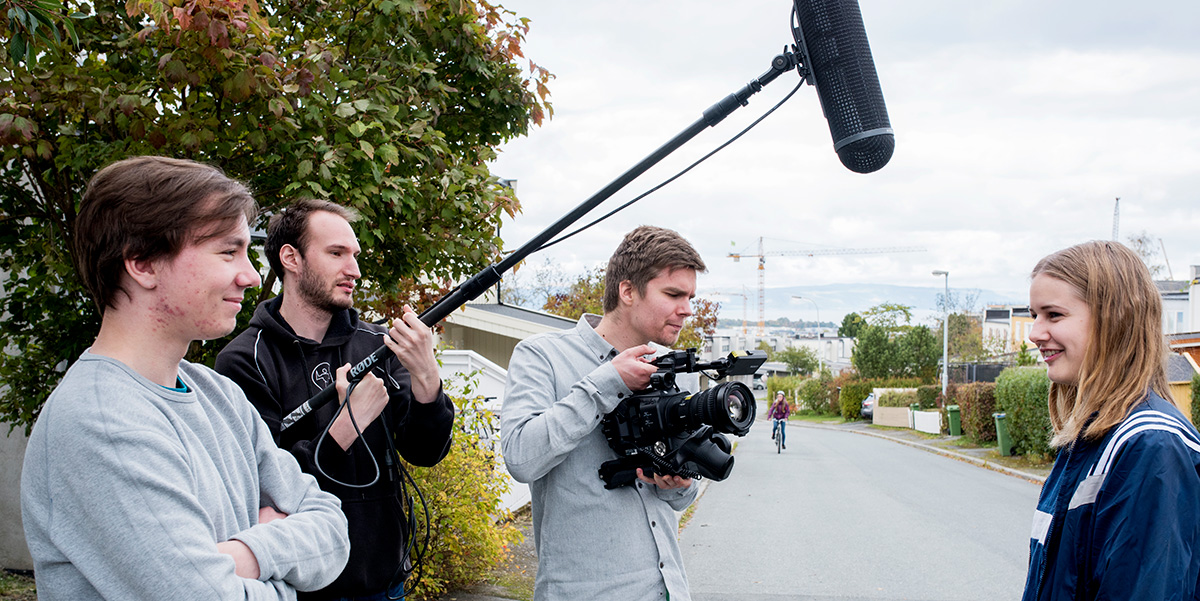Film and Video Production (Master's programme)

Film and Video Production
Film and Video Production - Master's Programme
Audiovisual media represent a fascinating potential for expression. The master's programme in Film and Video Production is a practical-theoretical programme of study aimed at students who wish to work with filmic devices.The master's programme in Film and Video Production builds on the bachelor's programme in Film and Video Production, but involves a deeper and more specialized study within the subject area.
The course of study aims to deepen the student's knowledge of the subject area through increasing specialization. Emphasis is placed on independent work under guidance of academic supervisors.
The programme of study provides insight into essential prerequisites for audiovisual media, as well as how technological development induces new expressions and offer arenas for interaction and display.
The master's degree is assessed by both examination and thesis. Therefore, the programme has two main components:
- One joint component comprised of a combination of compulsory and optional theory- and methodology courses. The theoretical components are linked to the fields of film studies. The practical components of the programme rest on and further develop the students' practical experience, and culminate in a final exam production. This component, including Experts in teams, provides a total of 60 credits.
- One master's thesis, which is a written report of a piece of independent scholarly work. This component provides a total of 60 credits. Work with the thesis takes place under the guidance of an academic supervisor.
The master's thesis is bisected, and consists of a minor theoretical piece of work, as well as a practical media production. The intended purpose behind the theoretical part of the thesis is to show that the candidate can work independently within the subject area. The practical production aims to demonstrate the candidate's proficiency in completing a comprehensive film and video production.
Why choose to study the master's programme in Film and Video Production?
The master's degree in Film and Video Production provides insight into and increased knowledge of filmic effects. It provides candidates with qualifications for teaching theoretical and practical topics within media education as well as for work within those professions in which complex issues need to be examined and disseminated. Successful completion of the degree may also lead to work in research, administration, information and media industries, film- and television production and cultural institutions.
The Department of Art and Media Studies owns modern media equipment. The Department offers the following recording formats: DVCPRO HD, XDCAM, HDV and DVCAM, and the following editing tools: Avid Media Composer, Final Cut Pro and Logic.
The language of instruction in this programme is Norwegian
You have to meet the Norwegian language requirements, or have a Scandinavian language as your mother tongue, if you want to apply to any of NTNU’s degree programmes taught in Norwegian.
You must also meet the basic requirement for admission, and demonstrate that you meet the English language requirements.
The application deadline for the programme is March 1st for students with an international degree, and April 15th for Norwegian and Nordic degree students. Students apply through NTNU søknadsweb.
The Faculty of Humanities offer a wide range of courses taught in English in various fields of study, both at bachelor's and master's level.
Contact information, Department of Art and Media Studies
- Phone: +47 73591820
- Fax: +47 73591830
- Email: kontakt@ikm.ntnu.no
- Web: https://www.ntnu.edu/ikm
- Opening hours: Telephone: mon-fri 0900-1500.
Visiting address:
NTNU Dragvoll, Building 8, level 3 and 4
Trondheim N-7491 Norway
Postal address:
NTNU
Department of Art and Media Studies
Trondheim N-7491 Norway
